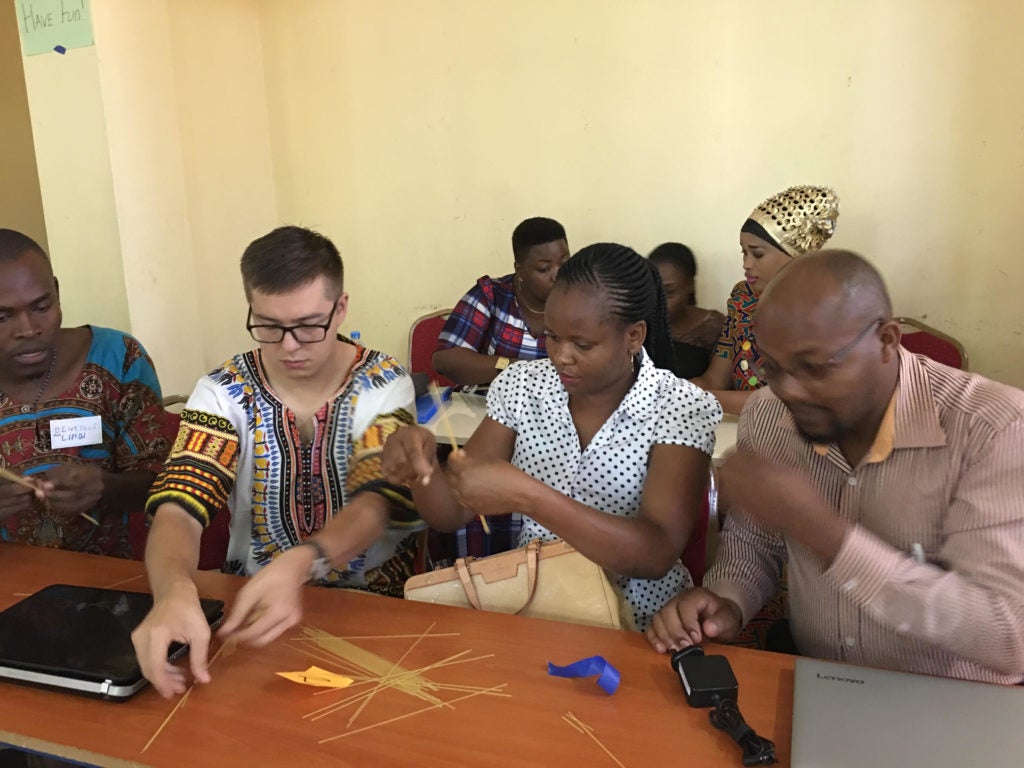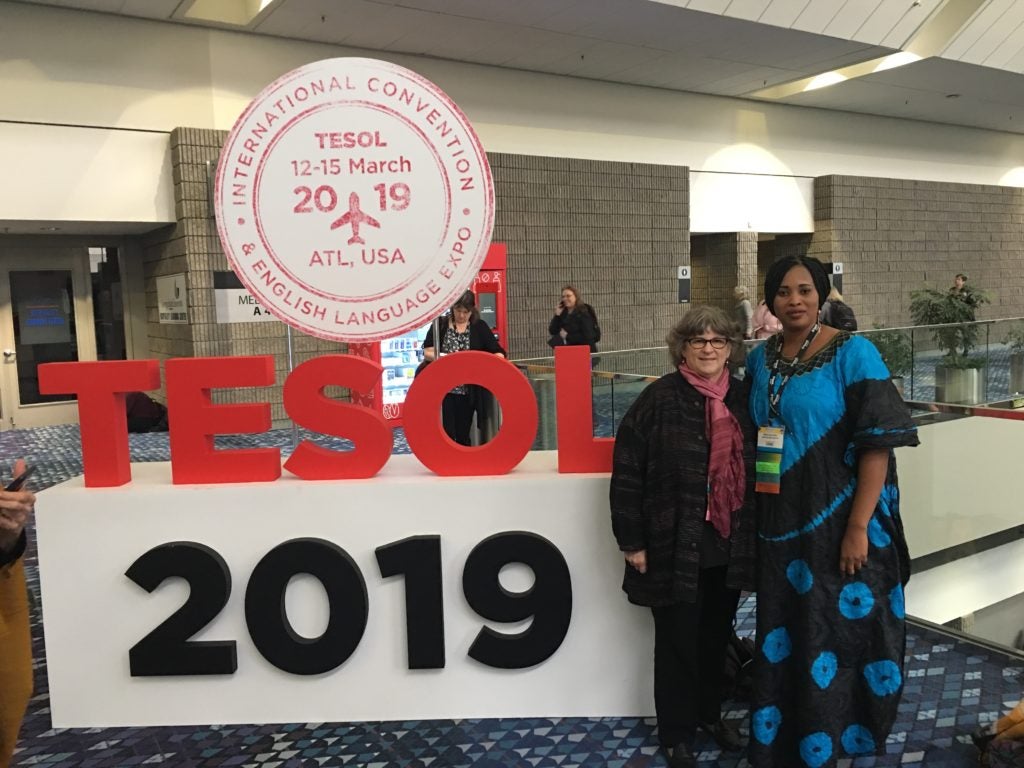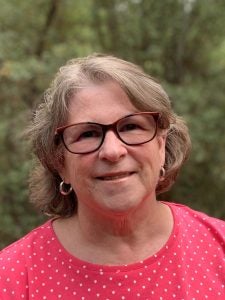“The beauty was, by integrating their skills and thinking about the demands of the content, the English language and STEM teachers acquired a common language. They were able to marshal their collective expertise.”
Dr. Ann Snow is a content-based instruction (CBI) guru. The author of numerous books and articles,
as well as a frequent presenter at national and international conferences, she is prolific on the topic of
CBI. So, when she received an English Language Specialist assignment in 2017 to conduct a
CBI-focused training in Tanzania, not only for English language instructors but also for secondary
school STEM teachers, she was thrilled. “This was a first for me, an opportunity to work abroad with
both STEM teachers and English language teachers together in the same room,” said Snow. “A dream
collaboration.”
Snow was particularly intrigued by the STEM focus. In Tanzania, as in most African nations, a major
push toward improving STEM education, particularly in secondary schools, is in place. However,
because all public secondary school instruction in Tanzania is in English – and not in the native
Kiswahili used in primary and middle schools – students are suddenly thrust into science and math
classes taught in a language they are still learning. To add to the difficulty, while the STEM teachers
know their subject matter well, they have varying levels of English language proficiency themselves and
many find it challenging to teach their course content in English.

The structure of Snow’s workshop tackled those issues directly. During the workshop’s first week, Snow
instructed 24 teachers, all leaders in the Tanzanian English Language Teachers Association (TELTA), in
the whys and hows of CBI, using what she called “the whole toolbox of the English language teacher’s
trade,” from quick writes to group work. For the second week, around 24 STEM instructors from across
the country, along with about 20 Peace Corps volunteers – also STEM teachers – joined the workshop.
Snow then paired STEM teachers with their TELTA counterparts, from the same school as much as
possible. “The beauty was, by integrating their skills and thinking about the demands of the content, the
English language and STEM teachers acquired a common language,” said Snow. “They were able to
marshal their collective expertise.”
Of course, there were challenges to overcome. Snow’s greatest hurdle that first week was helping the
TELTA instructors to think about English in a new way. “They just loved grammar,” recalled Snow.
“Get them talking about relative clauses, and their eyes lit up. I had to help them to look at language
beyond those narrow parameters, to see how language is used in the discourse communities of the
STEM disciplines and how to view content as a vehicle for language learning.” Toward that end, Snow
and the teachers explored science textbooks used in Tanzania’s public secondary schools, examining
how grammatical elements such as tense and voice, for example, were used in science texts. “That was
my challenge, to take their deep background knowledge of English structure and show them how to
apply it to the STEM material,” said Snow.

Both the TELTA and STEM teachers enjoyed numerous “aha” moments. In working to shift their
approach to vocabulary, for example, Snow had workshop participants look at key vocabulary in pieces
of text for specific content areas. In a typical Tanzanian classroom, students are required to memorize
vocabulary, but Snow asked workshop participants to look beyond the terms – that is, content words
such as cell or organism in biology, what Snow called “the bricks” – and see the role of the
non-technical words surrounding them – “the mortar that held those bricks together.” “Using that
approach illuminated not just the words, but the content itself,” said Snow.
Gratifyingly for Snow, the life of this assignment extended beyond the two-week project in Tanzania.
Participating STEM teachers returned to their schools and became trainers themselves, leading
after-school workshops in how to apply CBI strategies to STEM courses. In addition, Snow organized a
panel for the 2019 TESOL International Convention in Atlanta and included several of the TELTA
trainers among the presenters.
“That was my challenge – to take [the teachers’] deep background knowledge of English structure and show them how to apply it to the STEM material.”
Snow notes another beneficiary of the teacher training: her students in the master’s degree program in
TESOL at California State University in Los Angeles. Prior to the workshop in Tanzania, the U.S.
Embassy in Dar es Salaam provided Snow with a variety of science textbooks, as well as the scope and
sequences of several STEM courses used in the country’s public secondary schools. Coincidentally, the
fall semester just prior to the December training, Snow taught the course “Teaching English for
Academic Purposes” at Cal State LA. Putting all the elements together, Snow assigned her students a
unique project: go through the ministry’s documents and related STEM textbooks and identify an
inventory of vocabulary, language functions, and discourse types that could be used in the training as a
model of processes the teachers would undertake for their own STEM lesson planning. In addition, her
students wrote an online needs assessment survey, which was sent to all workshop participants prior to
the training. “In my final Specialist report for this assignment, I could actually say my students were
able to collaborate with me in a meaningful and highly constructive way,” said Snow. “They were able
to directly apply what they were learning in their MA class and create materials that were immediately
put to use in the workshop and later in the STEM classroom.”

Marguerite Ann Snow, Ph.D. is Professor and Department Chair at California State University, Los Angeles where she teaches in the TESOL M.A. program. She is co-author/co-editor of 11 books, including her most recent book, The Content-Based Classroom: New Perspectives on Integrating Language and Content with Donna Brinton and Teaching English as Second or Foreign Language (4th ed.) (2014) with Marianne Celce-Murcia and Donna Brinton. She served as consultant for Q: Skills for Success (Oxford University Press), an ESL/EFL textbook series. At Cal State LA, Dr. Snow received the President’s Distinguished Professor Award. She is a two-time Fulbright scholar: Hong Kong (1985) and Cyprus (2009). In addition to working closely with public school teachers in the U.S., she has made over 50 trips to teach or consult in international settings.
